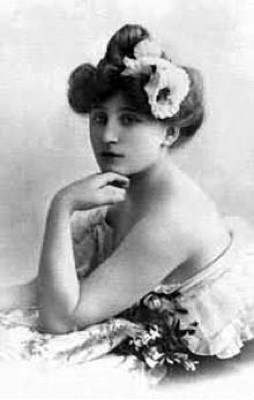Collette: The Movie

Who was Colette, the legendary French writer, anyway? Was she the farm girl turned city Princess? High Society doyen? Brilliant writer? Heterosexual? Homosexual? Bold journalist? Empowered woman of 1905? Happily married? Tragically married?
Colette, born in 1873, was all of them, plus a few more. She was attractive and, portrayed in the new movie Colette, that just opened, by the lovely Keira Knightly, saucy and sexy as well. The film is the highly entertaining tale of a woman who has burst the chains her husband has tied her up in and shouts out to the world “look out, here I come.” It is also a film about stodgy Paris high society at the turn of the century, the rich, the influential and all those women in 1905 Paris toting her books around wishing they were her.
When we meet Colette in the film she is the very young girlfriend of Willy, a good looking, fast talking, 40ish, exuberant Parisian “writer” with a slick Van Dyke beard who has gargantuan tastes in life and women. They marry and he carries her off to Paris --- to write his books along with others. She is very, very good at it, but her name never appears on any of them. Willy is the “author” of them all. She is one of a stable of writers that do Willy’s work for him. After a while, she bristles at the job, especially when he locks her in a room and orders her to write more books under his name. Colette implores her husband to put her name on her books. He refuses. She rebels.
Throughout the movie, Colette grows and Willy really does not. She becomes well dressed, highly fashionable, hangs out with Paris’ upper crust, is the belle of every ball she goes to and is the Queen of the night. This is all due to Willy, but about three quarters of the way through the film she blossoms on her own and then there is no holding her back.
She is a sexual tornado, too. Early on, her husband chastises her for flirting with a male friend and she looks him right in the eye and tells him that she was not; she was flirting with the friend’s wife. The two women soon tumble into bed together. Then there is another woman, and then another. She eventually finds herself in a long-term relationship with a man who is really a woman and makes it work.
The movie is gorgeous, almost as gorgeous as Ms. Knightly. The cinematography is rich in color, whether farm houses or theaters or Paris night clubs. The story is both a small tale and a big one. There is mercurial dancing on table tops by a gregarious Willy. We see the slow evolution from dainty Colette in demure dresses to a brazen and bombastic Colette parading around Paris in men’s suits.
Knightly is a delight, an absolute wonder, as the quixotic Colette. You have to cheer for her as she tries to get her name on her own books and, at the same time, fear that either Willy or the world is going to flatten her. Dominic West is quite good as the garrulous, nonstop talker Willy. He knows he is deceiving and cheating Colette right from the start and just dismisses the idea, telling her that it is a man’s world and men, and he, can do whatever they want to women. It is cold and stark and true. It causes you to shudder a bit.
The pair are joined by a talented ensemble of actors, all led by skilled director Wash Westmoreland.
The director, who also wrote the movies, and screenwriters Richard Glatzer and Rebecca Lenkiewicz, wisely keep the story tight and end it when Colette becomes a music hall performer. To tell her whole story would overwhelm the viewer. As an example, she had a long career as a music hall performer and wrote a novel about it, The Vagabond, that was a best-seller. She was 67 when the Nazis overran France in 1940 and spent the war protecting her second husband, who was Jewish.
In a scroll at the end of the film, you find out about all the novels and short stories she wrote and the literature awards that she won. She was nominated for the Nobel Prize in Literature in 1948. Most of her works were about women trying to gain some justice in a man’s world.
Colette, who died at 81, also wrote the novella Gigi. upon which the famous stage musical and movie were made. The film won the Best Picture Oscar in 1958.
If you go to Paris today, you’ll find Collette’s spirit in the streets or clubs somewhere, dancing with a man or woman, singing, preaching, writing best sellers and living life to the full in all the colors of the rainbow.
In the movie Gigi, Maurice Chevalier sang that great song "Thank Heaven for Little Girls." Thank heaven for Colette, too.